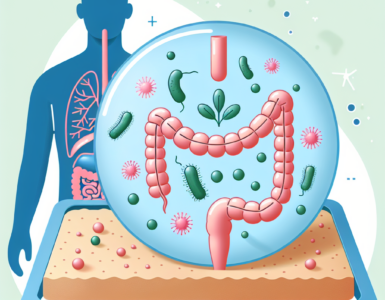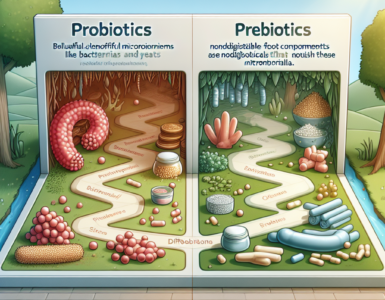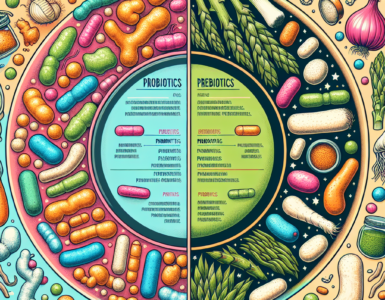Introduction to Protein
Understanding Macronutrients
Macronutrients are the nutrients the body needs in large amounts to maintain essential functions and provide energy. They include carbohydrates, fats, and proteins, each playing a distinct role in supporting health and well-being. Carbohydrates are the body’s primary energy source, fats provide sustained energy and support cell growth, and proteins are the building blocks for repairing and building tissues.
The Role of Protein in the Body
Proteins are complex molecules composed of amino acids that are crucial for the body’s structural and functional components. They are involved in virtually every bodily process, from the formation of muscles and connective tissues to the synthesis of hormones and enzymes. The benefits of protein in the body are extensive and include:
- Maintaining and building muscle mass.
- Supporting metabolic processes.
- Regulating hormones that control appetite and satiety.
- Ensuring proper immune function.
- Providing energy when carbohydrate reserves are depleted.
Proteins are essential for life, and adequate intake is vital for overall health and body maintenance. The table below displays the Recommended Dietary Allowance (RDA) for protein, illustrating how much individuals should aim to consume daily based on their age and sex.
| Age Group | Recommended Dietary Allowance (RDA) for Protein (grams per day) |
|---|---|
| 1-3 years | 13 |
| 4-8 years | 19 |
| 9-13 years | 34 |
| 14-18 years (male) | 52 |
| 14-18 years (female) | 46 |
| 19-70+ years (male) | 56 |
| 19-70+ years (female) | 46 |
Understanding the role of protein and ensuring its adequate intake can significantly influence one’s health trajectory, especially for those focused on weight management and metabolic enhancement.
Essential Benefits of Protein
Protein, a vital macronutrient, plays a significant role in various bodily functions, including muscle synthesis, weight regulation, and bone maintenance.
Muscle Growth and Repair
Protein is the building block of muscles, providing the necessary amino acids that the body requires to repair and grow muscle tissue. After physical activity, muscles undergo stress and micro-tears, which protein helps to heal, leading to muscle growth.
| Activity Level | Recommended Protein Intake (g/kg of body weight) |
|---|---|
| Sedentary | 0.8 |
| Moderate Activity | 1.2 – 1.7 |
| High-intensity Athletes | 1.4 – 2.0 |
Adequate protein intake is critical for athletes and those engaged in regular exercise as it supports both recovery and increases in muscle mass.
Weight Management and Satiety
Protein’s role in weight management is twofold; it promotes satiety and aids in the preservation of lean muscle mass during weight loss. High-protein foods require more energy to metabolize, which can lead to a higher caloric burn. They also help individuals feel fuller for longer periods, which can reduce overall calorie intake.
| Nutrient | Satiety Index Score |
|---|---|
| Protein | 150 – 200 |
| Carbohydrates | 100 |
| Fats | Less than 100 |
A higher score indicates greater satiety. Protein’s satiating properties make it an essential component of any diet focused on weight loss or management.
Bone Health
Protein contributes to bone health by providing structural support and aiding in the maintenance of bone density. Adequate protein intake is essential for bone formation and may help prevent osteoporosis, a condition characterized by weak and brittle bones.
| Age Group | Recommended Protein Intake (g/day) |
|---|---|
| Adults | 46 – 56 |
| Seniors | 56 – 68 |
Ensuring sufficient protein consumption can support bone strength and longevity, especially as individuals age. It is important to balance protein intake with other nutrients that support bone health, such as calcium and vitamin D.
Metabolic Advantages of Protein
Protein, a critical macronutrient, not only supports muscle growth and repair but also offers significant metabolic advantages. Understanding how protein intake can influence metabolism may provide individuals with a strategic advantage in achieving their health and fitness goals.
Boosting Metabolism
Protein consumption can lead to a boost in metabolic rate, which is the rate at which the body expends energy. This is due to the energy required to digest, absorb, and process the nutrients in foods, a phenomenon known as the thermic effect of food, which is particularly high for protein. Studies suggest that protein can increase the metabolic rate by 15-30%, compared to 5-10% for carbohydrates and 0-3% for fats.
| Nutrient | Increase in Metabolic Rate |
|---|---|
| Protein | 15-30% |
| Carbohydrates | 5-10% |
| Fats | 0-3% |
The increased energy expenditure associated with protein intake may contribute to weight loss and prevent metabolic slowdown during calorie restriction.
The Thermic Effect of Food
The thermic effect of food (TEF) refers to the energy expended by our bodies to process food for use and storage. Protein has a higher TEF compared to carbohydrates and fats, meaning that the body burns more calories to process protein. This higher thermic effect contributes to the overall metabolic advantages of protein, aiding in weight management and fat loss.
To illustrate the thermic effect of different macronutrients, consider the following table:
| Nutrient | Thermic Effect |
|---|---|
| Protein | 20-30% of total calories consumed |
| Carbohydrates | 5-10% of total calories consumed |
| Fats | 0-3% of total calories consumed |
Increasing protein intake can thus be an effective strategy for those looking to enhance their metabolism and optimize their body’s energy expenditure. By incorporating a higher proportion of protein-rich foods into one’s diet, individuals may experience an increase in metabolic rate and an improved ability to manage weight.
Protein’s Impact on Body Functions
Protein, one of the three main macronutrients, plays a pivotal role in the maintenance and regulation of body functions. This section delves into the multifaceted contributions of protein to hormone regulation and enzyme production and function.
Hormone Regulation
Proteins are fundamental in the synthesis and function of hormones, which are chemical messengers that govern a plethora of bodily processes, including metabolism, growth, and mood. Amino acids, the building blocks of proteins, are essential for the production of hormones such as insulin, which regulates blood sugar levels, and growth hormone, which is crucial for development and repair.
The balance and timing of hormone release are critical for health, and adequate protein intake ensures the body has the necessary components to build these hormones. For instance, the hormone glucagon, which helps maintain blood sugar levels, is also made up of amino acids provided through protein consumption.
| Hormone | Role in the Body | Amino Acids Required |
|---|---|---|
| Insulin | Regulates blood glucose | Leucine, Valine, Isoleucine |
| Thyroid Hormones | Regulates metabolism | Tyrosine, Iodine |
| Growth Hormone | Stimulates growth, cell reproduction | Arginine, Methionine, Glutamine |
Enzyme Production and Function
Enzymes, another class of proteins, are catalysts that accelerate biochemical reactions in the body, making them essential for digestion, energy production, blood clotting, and muscle contraction, among other functions. Without enzymes, many reactions would not occur fast enough to sustain life.
Each enzyme is specific to a particular reaction or group of reactions. Proteins provide the structure and active sites necessary for enzyme function. The amino acids in the active site interact with a substance, facilitating its transformation into a different product.
| Enzyme | Function | Active Site Amino Acids |
|---|---|---|
| Amylase | Breaks down carbohydrates | Aspartic acid, Histidine |
| Lipase | Breaks down fats | Serine, Aspartate, Histidine |
| Protease | Breaks down proteins | Serine, Histidine, Aspartate |
In summary, proteins are indispensable for the proper regulation of hormones and the production and function of enzymes. They contribute to the body’s homeostasis, ensuring that all systems operate optimally. Adequate protein intake is thus vital for maintaining these critical body functions.
Immune System Support
The immune system is a complex network that protects the body against illness and disease. Proteins play a pivotal role in supporting and regulating this system, highlighting one of the many benefits of protein in the body.
Protein’s Role in Immune Health
Proteins are essential for the development and function of the immune system. They are the building blocks of many immune cells, including T-cells, B-cells, and macrophages, which are crucial for the body’s defense mechanisms. Adequate protein intake ensures these cells are produced correctly and function optimally.
Furthermore, proteins facilitate the healing process following an infection or injury by repairing and replacing damaged cells and tissues. A deficiency in protein can lead to a weakened immune response, making the body more susceptible to infections.
Antibodies: The Body’s Defense Proteins
Antibodies, also known as immunoglobulins, are specialized proteins that are critical components of the immune system. They are produced by B-cells and help identify and neutralize foreign invaders such as viruses and bacteria.
| Antibody Class | Function |
|---|---|
| IgA | Protects against infections in mucous membranes |
| IgD | Activates basophils and mast cells |
| IgE | Protects against parasites and allergic reactions |
| IgG | Provides long-term immunity and passive protection in newborns |
| IgM | Eliminates pathogens in the early stages of immune response |
The production of antibodies requires a sufficient supply of protein. Without adequate protein, the body may struggle to produce enough antibodies, or the antibodies may not be as effective in protecting against disease-causing agents.
In conclusion, the benefits of protein in the body extend to the vital role it plays in maintaining a robust immune system. Ensuring a sufficient intake of quality protein is fundamental for immune health, contributing to the body’s ability to fend off infections and disease.
Protein and Energy Levels
Protein plays a crucial role in maintaining steady energy levels throughout the day. Unlike carbohydrates, which can cause blood sugar levels to spike and then plummet, protein provides a more consistent source of energy. This section will explore how protein helps balance blood sugar levels and contributes to sustained energy.
Balancing Blood Sugar Levels
Protein has a stabilizing effect on blood sugar. When consumed with carbohydrates, it slows the absorption of sugar into the bloodstream, preventing the sharp spikes and drops that can lead to energy crashes. This is particularly beneficial for individuals managing diabetes or those looking to maintain steady energy levels.
| Nutrient Combination | Blood Sugar Impact |
|---|---|
| Carbohydrates alone | High fluctuation |
| Carbohydrates with protein | Moderate fluctuation |
| Protein alone | Low fluctuation |
By incorporating protein into meals and snacks, individuals can achieve a balanced energy intake that supports daily activities without the unwanted highs and lows.
Sustained Energy Throughout the Day
The body takes longer to digest protein than carbohydrates, leading to a prolonged feeling of fullness and a steady supply of energy. This can help individuals avoid overeating and snacking excessively, which is beneficial for weight management.
To optimize energy levels, it is recommended to include protein in every meal. This practice supports metabolism and provides ongoing fuel for the body’s needs.
| Meal Time | Suggested Protein Intake |
|---|---|
| Breakfast | 15-25g |
| Lunch | 20-30g |
| Dinner | 20-30g |
| Snacks | 5-15g |
By understanding the benefits of protein in the body, particularly in relation to energy levels, individuals can make informed dietary choices that support their overall health and well-being.
Psychological Well-being
Exploring the benefits of protein in the body extends beyond physical health. Protein also plays a significant role in psychological well-being, influencing mood and cognitive function.
Protein’s Influence on Mood and Cognitive Function
Proteins are the building blocks of neurotransmitters, the chemical messengers that carry signals between neurons in the brain. These neurotransmitters, such as dopamine and serotonin, are critical for regulating mood and cognitive functions. Amino acids, the components of proteins, are precursors to these neurotransmitters. For instance, the amino acid tryptophan is involved in the production of serotonin, which is often referred to as the ‘feel-good’ neurotransmitter because of its role in promoting a sense of well-being and happiness.
Moreover, adequate protein intake can influence cognitive abilities like learning and memory. Proteins are essential for brain function as they contribute to the repair and growth of neural tissues. The table below illustrates the relationship between protein intake and neurotransmitter production:
| Amino Acid | Neurotransmitter | Function |
|---|---|---|
| Tryptophan | Serotonin | Mood regulation, sleep, and appetite control |
| Tyrosine | Dopamine | Reward, motivation, and attention |
| Phenylalanine | Epinephrine | Response to stress, alertness, and decision-making |
In addition to neurotransmitter synthesis, proteins play a role in stabilizing blood sugar levels, which can impact mental clarity and energy levels throughout the day. Stable blood sugar helps prevent mood swings and energy crashes that can affect cognitive performance and mood.
Integrating a balanced amount of protein into one’s diet is important for optimizing these psychological functions. While the focus is often on the physical health benefits of protein, its impact on mental health and cognitive processes is an equally vital aspect of overall well-being.
Ensuring consistent and adequate protein consumption can support a balanced mood, sharp cognitive abilities, and overall psychological health, highlighting the multifaceted benefits of protein in the body.
Protein’s Role in Aging
As individuals age, the significance of maintaining an adequate protein intake becomes paramount. The effects of protein on aging are considerable, particularly when it comes to preserving muscle mass and meeting the nutritional needs of the elderly.
Preserving Muscle Mass
Muscle mass naturally declines with age, a condition known as sarcopenia. This loss of muscle contributes to a decrease in strength, mobility, and overall health. Protein plays a critical role in counteracting this process by providing the necessary building blocks for muscle maintenance and repair.
Incorporating a sufficient amount of protein into the diet can help older adults retain muscle mass and strength. Resistance training combined with adequate protein intake has been shown to be particularly effective in preserving lean muscle tissue.
| Age Group | Recommended Protein Intake (g/kg of body weight) |
|---|---|
| Adults (19-64 years) | 0.8-1.0 |
| Older Adults (65+ years) | 1.2-1.5 |
Protein Needs for the Elderly
The protein requirements for the elderly are higher than those for younger adults. This is due to a reduced efficiency in protein utilization as well as the need to counteract the loss of muscle mass associated with aging. Ensuring that older adults consume enough high-quality protein can help maintain muscle function and overall health.
Older adults should aim for a protein intake that is distributed evenly throughout the day, rather than concentrated in one meal. This approach maximizes protein synthesis and supports muscle maintenance more effectively.
It’s also essential for the elderly to choose protein sources that are easily digestible and contain all the essential amino acids. Options such as lean meats, dairy products, eggs, and plant-based proteins like legumes and soy products can provide the necessary nutrients.
By understanding the benefits of protein in the body, particularly during the aging process, individuals can make informed dietary choices that support a healthy and active lifestyle well into their senior years.
Protein Intake and Physical Performance
Protein is a pivotal macronutrient for individuals who are highly active, especially athletes. Its role in physical performance is multifaceted, influencing everything from muscle function to recovery after strenuous activity.
The Importance of Protein for Athletes
Athletes require more protein in their diet compared to non-athletes due to the increased need for muscle repair and growth. Engaging in regular training sessions increases the demand for protein to facilitate the repair of muscle fibers that are broken down during exercise. Additionally, for athletes looking to increase muscle mass, protein is the building block necessary for muscular hypertrophy.
The table below outlines the recommended protein intake for different types of athletes:
| Athlete Type | Recommended Protein Intake (g/kg of body weight) |
|---|---|
| Endurance Athletes | 1.2 – 1.4 |
| Strength Athletes | 1.6 – 1.7 |
| Team Sport Athletes | 1.4 – 1.5 |
These recommendations are designed to cater to the varying demands of different athletic pursuits, ensuring that athletes receive the right amount of protein to support their training and performance goals.
Recovery and Protein
Protein plays a crucial role in the recovery process post-exercise. Consuming protein after a workout can help reduce muscle soreness, accelerate recovery time, and replenish amino acids that were expended during physical activity.
For recovery purposes, it’s not just about the quantity of protein consumed, but also the timing. Research suggests that consuming protein soon after exercise can enhance muscle protein synthesis, which is vital for recovery and adaptation to training.
The following list represents the protein intake recommendations for post-exercise recovery:
- Immediately post-exercise: 15-25 grams of high-quality protein
- Every 3-5 hours over multiple meals: Protein-rich meals to maintain a positive protein balance
It is important to remember that while protein is critical for recovery, it should be part of a balanced diet that includes adequate carbohydrates and fats to fully support the body’s recovery and energy needs.
Protein for Skin and Hair
The impact of protein extends beyond muscle repair and weight management; it is also a cornerstone for maintaining healthy skin and hair. The structural integrity of both skin and hair relies heavily on protein, particularly two types: collagen and keratin.
Structural Proteins: Collagen and Keratin
Collagen and keratin are the primary structural proteins that provide strength and resilience to skin and hair. Collagen is a pivotal component in the connective tissues of the skin, playing a crucial role in maintaining skin elasticity and preventing sagging. Keratin, on the other hand, is the main protein found in hair strands, responsible for giving hair its structure and protective qualities.
| Structural Protein | Function |
|---|---|
| Collagen | Provides skin elasticity and firmness, reduces fine lines and wrinkles |
| Keratin | Strengthens hair, prevents breakage, maintains smoothness |
Adequate protein intake is essential for the synthesis of these structural proteins. When the body has a sufficient supply of protein, it is able to effectively produce collagen and keratin, which contribute to the skin’s youthful appearance and the hair’s robust condition. Conversely, a deficiency in protein can lead to a range of issues, including a lackluster complexion, skin that is more prone to wrinkles, and hair that is brittle and lackluster.
Incorporating a variety of protein-rich foods in one’s diet can support the ongoing production of these critical proteins. Foods that are high in amino acids, which are the building blocks of protein, can help the body synthesize collagen and keratin more efficiently.
The benefits of protein in the body are manifold, influencing not only internal functions but also external appearance. Ensuring that one’s diet is rich in high-quality protein can lead to visible improvements in skin texture and hair health, showcasing the undeniable connection between nutrition and personal care.
Meeting Your Protein Needs
Protein is an essential macronutrient that plays a critical role in various bodily functions, from muscle repair to enzyme production. To harness the full range of benefits of protein in the body, it is important to consume adequate amounts from high-quality sources.
Identifying High-Quality Protein Sources
High-quality protein sources are foods that provide all the essential amino acids that the body cannot produce on its own. These sources include both animal and plant-based proteins. Animal-based proteins typically contain all the essential amino acids and are considered “complete” proteins. Examples include:
- Meat (chicken, turkey, beef)
- Fish (salmon, trout, tuna)
- Dairy (milk, cheese, yogurt)
- Eggs
On the other hand, many plant-based proteins are considered “incomplete” because they lack one or more essential amino acids. However, by combining different plant-based foods, one can obtain all the necessary amino acids. Examples of plant-based proteins include:
- Legumes (beans, lentils, chickpeas)
- Nuts and seeds (almonds, chia seeds, flaxseeds)
- Whole grains (quinoa, brown rice, barley)
- Soy products (tofu, tempeh)
It’s important to note that the digestibility and absorption of protein from food sources can vary. Animal-based proteins are typically more easily digested and absorbed, while some plant-based proteins may require careful combination to ensure all amino acids are consumed.
Daily Protein Requirements
Daily protein requirements differ based on various factors, including age, sex, weight, and level of physical activity. The Recommended Dietary Allowance (RDA) for protein for the average adult is 0.8 grams per kilogram of body weight. However, individuals who are highly active or looking to build muscle mass may require more protein.
| Population | Protein RDA (grams per kilogram) |
|---|---|
| Average adults | 0.8g |
| Endurance athletes | 1.2 – 1.4g |
| Strength athletes | 1.6 – 1.7g |
| Pregnant or breastfeeding women | Additional 10 – 20g |
To calculate your protein needs, you can multiply your weight in kilograms by the appropriate RDA value. For example, a sedentary woman weighing 68 kilograms (150 pounds) would require approximately 54 grams of protein per day.
It’s important to spread protein intake throughout the day and include a source of protein in each meal to optimize the body’s use of amino acids. By understanding and meeting your daily protein requirements, you can enjoy the full range of benefits that this vital macronutrient has to offer for bodily functions and overall health.
Disclaimer: The information provided on the consumption of protein is for educational purposes only and is not intended as medical advice. Individual protein needs vary based on factors such as age, sex, health status, and level of physical activity. Excessive protein intake can have health implications. It is recommended to consult with a healthcare professional or a registered dietitian to determine the appropriate amount of protein for your specific health needs and dietary goals.











